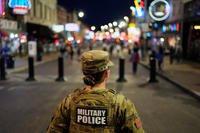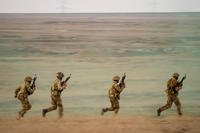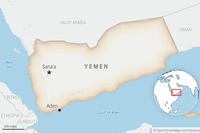A group of House Democrats is pressing the Pentagon for answers following reports suggesting the U.S. military may have helped Nigerian forces with a 2017 airstrike that killed more than 160 civilians at a refugee camp in the African country.
The request came in a letter Thursday to Defense Secretary Lloyd Austin sent by the five members of the newly formed Protection of Civilians in Conflict Caucus, launched last month after the Defense Department announced new efforts to prevent civilian deaths and injuries from U.S. military operations.
"Civilians should never be targeted in war. Unfortunately, that's exactly what happened in Nigeria in 2017," Rep. Sara Jacobs, D-Calif., co-chair of the caucus, said in a statement about the letter.
Read Next: Soldiers Can't Transfer Just Because of Abortion Bans or LGBTQ Laws, Army Chief Says
The caucus "demand" includes answers to whether the U.S. military and its intelligence played a role in the strike, the U.S. took measures to limit civilian casualties, and the damage has been adequately addressed, Jacobs said.
Asked for comment on the letter or the reports on which the letter is based, the Pentagon told Military.com only that "as with all correspondence received from lawmakers, the secretary will respond to the authors of the letter in due course."
The Pentagon under Austin has vowed to better protect civilians from military operations, including the creation last month of a new office focused on the issue called the Civilian Protection Center of Excellence.
The renewed emphasis on preventing civilian casualties came after a series of botched strikes and grim headlines, including an August 2021 airstrike that killed 10 innocent Afghans; a Rand Corp. study that found at least 774 civilians died in the battle against ISIS for Raqqa, Syria, in 2017; and a New York Times report that a 2019 U.S. strike in Baghuz, Syria, killed about 70 civilians, including women and children.
"The protection of civilians is a strategic priority as well as a moral imperative," Austin wrote in a memo last month. "Our efforts to mitigate and respond to civilian harm directly reflect our values and also directly contribute to achieving mission success."
The strike in Africa may become the latest civilian casualty issue for the Pentagon. In a 2017 operation, the Nigerian Air Force bombed a refugee camp near Rann, Nigeria, under the mistaken belief that it was an encampment for the terrorist group Boko Haram. The airstrikes killed more than 160 people, including nine humanitarian workers, and injured more than 120, according to a U.N. report on the incident.
Nigerian officials have apologized for the strike, with President Muhammadu Buhari calling it "a regrettable operational mistake."
In July, news outlet the Intercept reported that U.S. Africa Command, or AFRICOM, conducted an internal investigation into the strike, citing a document it obtained through the Freedom of Information Act.
The document said that Brig. Gen. Frank Stokes, the command's deputy director of strategy, plans and programs, was tasked with probing U.S. information sharing with Nigeria's military, including protocols for how the information is used and damage assessments after shared information is used for a strike, according to the Intercept.
Stokes was also told to "gather and preserve any background information that is relevant to a complete understanding of U.S.-Nigerian operations such as this strike," the Intercept reported. Despite the document, a spokesperson for AFRICOM told the Intercept the command "was not involved" in the strike.
In addition to the Intercept report, lawmakers also cited a report from Nigerian news outlet The Cable that quoted regional military commander Gen. Lucky Irabor as saying the strike was based on "intelligence received." While the general did not say where the intelligence came from, the news outlet also cited an unnamed military source as saying it came from "one of the powerful countries in the West."
"Given the previously unreported nature of the U.S. military's involvement in this strike and subsequent investigation, and your recent commitments to transparently responding to civilian harm, we request that the Department make available the investigation and all accompanying documentation to members of the House Armed Services Committee," the lawmakers wrote in their letter to Austin.
The lawmakers also pressed Austin on the exact nature of U.S. involvement in the strike, whether the U.S. military provided intelligence for the strike and to what extent AFRICOM knew about the strike. They also asked Austin more broadly whether the U.S. military has provided intelligence or other support to the Nigerian military for airstrikes or ground operations since January 2017.
In addition to Jacobs, the letter was signed by Democratic Reps. Jason Crow of Colorado, Ro Khanna of California, Andy Kim of New Jersey and Tom Malinowski of New Jersey.
-- Rebecca Kheel can be reached at rebecca.kheel@military.com. Follow her on Twitter @reporterkheel.
Related: Military Gets New Office to Help Limit Civilian Deaths and Injury















